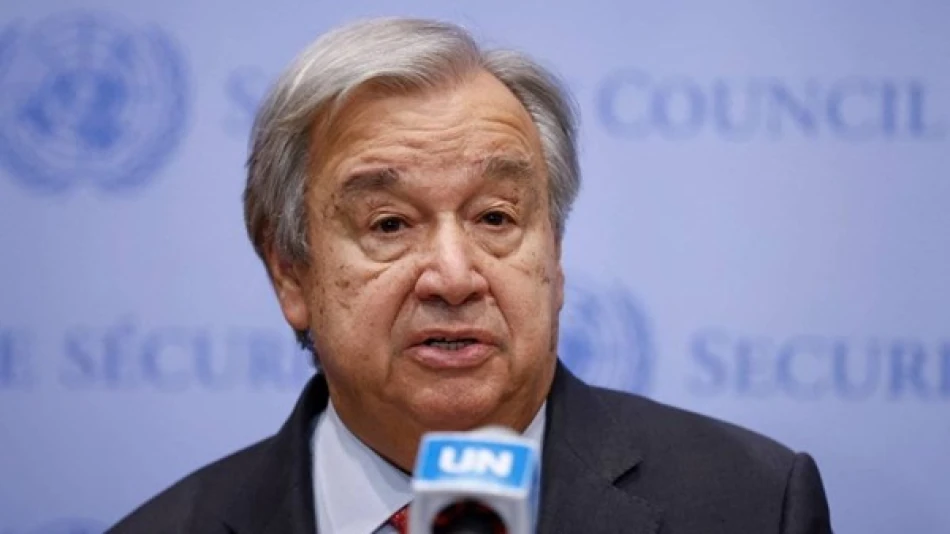
UN Chief Warns of Perilous Military AI Risks, Calls for Ethical Oversight
UN Chief Demands Immediate Global Action to Regulate Military AI Before It's Too Late
UN Secretary-General António Guterres has issued an urgent call for international regulation of artificial intelligence in warfare, warning that autonomous weapons systems capable of making life-and-death decisions represent a "morally repugnant" threat to global security. His stark warning, delivered in a report to the UN General Assembly, signals growing alarm among world leaders about the rapid militarization of AI technology and the erosion of human control over lethal force.
The Moral Red Line: Human Control Over Life and Death
Guterres drew a clear ethical boundary, emphasizing the UN's unwavering opposition to any weapons system that possesses discretionary authority to take human lives without direct human intervention. This position reflects mounting concerns that fully autonomous weapons—often dubbed "killer robots"—could fundamentally alter the nature of warfare and accountability.
The Secretary-General's emphasis on maintaining human control over nuclear weapons decisions is particularly significant, given the catastrophic potential of AI errors in nuclear command and control systems. This echoes longstanding concerns among arms control experts who worry that AI could accelerate decision-making timelines beyond human comprehension, potentially triggering accidental nuclear exchanges.
The Double-Edged Sword of Military AI
Potential Benefits and Inherent Risks
While acknowledging that AI could theoretically improve military precision and reduce human error, Guterres highlighted the technology's darker implications. The dual-use nature of AI—where civilian applications can be rapidly repurposed for military use—creates unprecedented challenges for monitoring and accountability.
This concern is already materializing in current conflicts. In Ukraine, both sides have deployed AI-enhanced drones and targeting systems, while commercial AI platforms are being adapted for military intelligence and planning. The speed of this technological adaptation far outpaces existing regulatory frameworks.
The Non-State Actor Threat
Perhaps most alarmingly, Guterres warned that AI could lower barriers for non-governmental actors—including terrorist groups—to develop or acquire biological and chemical weapons. This democratization of destructive capability represents a paradigm shift in global security threats, moving beyond traditional state-to-state deterrence models.
International Law in the Age of Autonomous Weapons
The Secretary-General stressed that nations must ensure AI military applications comply with existing international humanitarian law, human rights law, and the UN Charter throughout the entire lifecycle of AI deployment. However, current international legal frameworks were developed long before autonomous weapons became feasible, creating significant gaps in governance.
Unlike previous arms control regimes that addressed specific weapons platforms, AI regulation must grapple with rapidly evolving software capabilities that can be updated remotely and repurposed across multiple domains. This technical complexity makes traditional verification and compliance mechanisms inadequate.
A Global Regulatory Framework Takes Shape
Guterres proposed establishing a comprehensive international mechanism to address military AI and its implications for international peace and security. This proposal will be considered during the UN General Assembly's 80th session in September, potentially marking a watershed moment for AI governance.
The timing is critical. Major military powers including the United States, China, and Russia are heavily investing in AI weapons systems, while smaller nations and private companies are rapidly developing dual-use AI technologies. Without coordinated international action, the world risks an AI arms race that could destabilize global security architecture.
The Path Forward: Transparency and Trust-Building
The UN chief called for enhanced cooperation between nations, particularly in areas of transparency and confidence-building measures. This approach mirrors successful precedents in nuclear arms control, where transparency mechanisms and regular dialogue helped prevent miscalculation during the Cold War.
However, AI presents unique challenges. Unlike nuclear weapons, which require specialized materials and facilities, AI capabilities can be developed by relatively small teams using commercially available hardware. This accessibility makes comprehensive monitoring far more difficult than traditional arms control regimes.
The international community now faces a narrow window to establish meaningful governance frameworks before military AI capabilities become too advanced and widespread to regulate effectively. Guterres' urgent call reflects the growing recognition that the choices made in the coming months could determine whether AI becomes a tool for enhanced security or an uncontrollable threat to human survival.
Most Viewed News

 Layla Al Mansoori
Layla Al Mansoori






